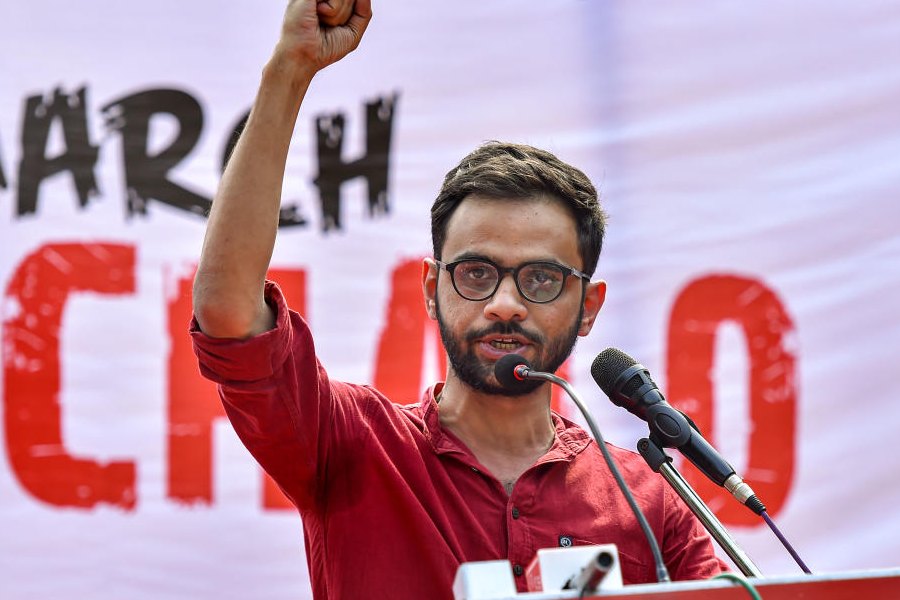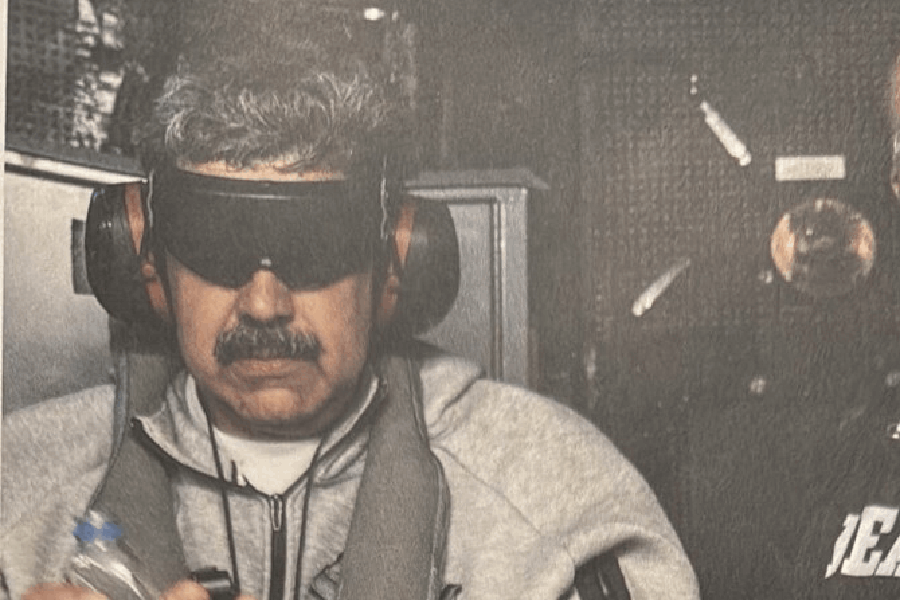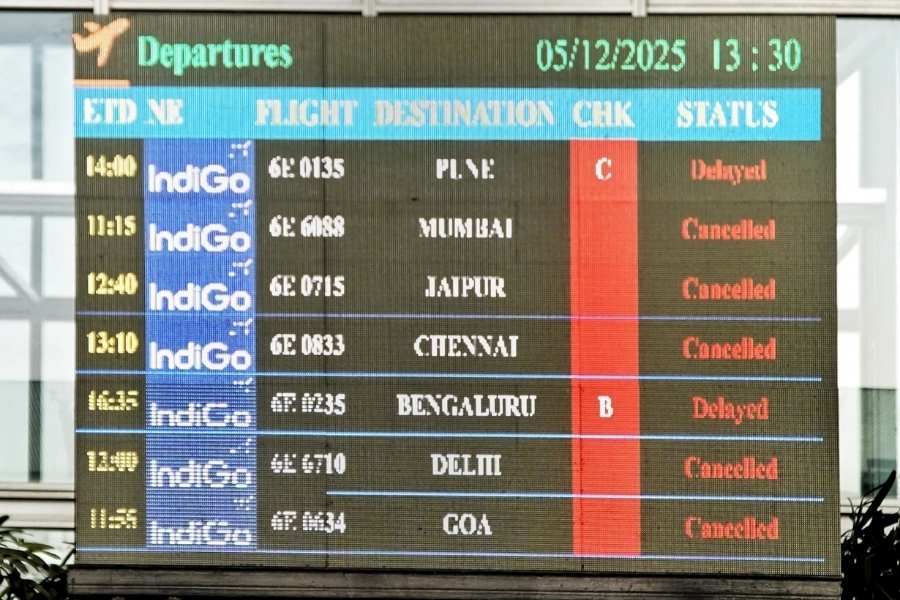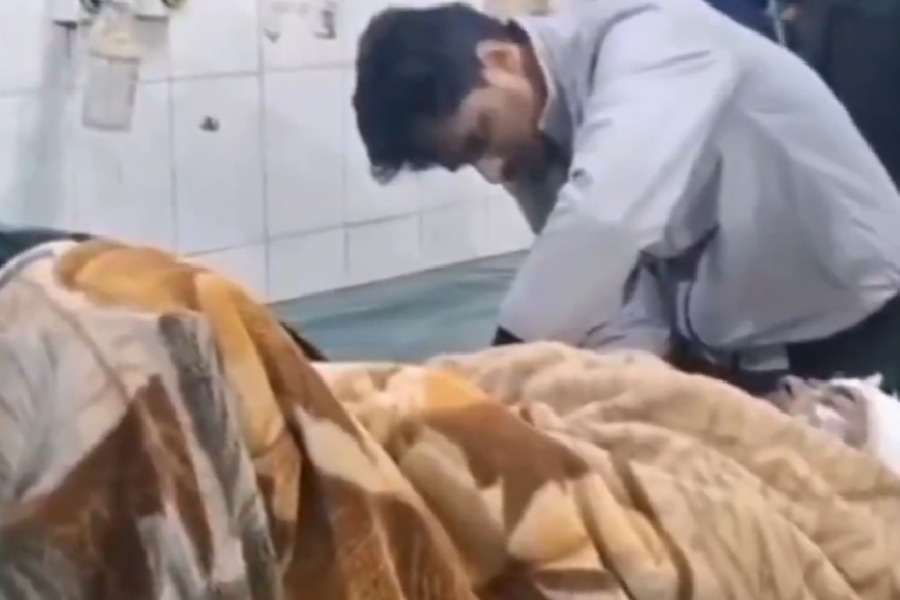 |
| Dulal Roy. Picture by S.H. Patgiri |
The game can be rather dull because all actors tend to play by the same set of rules. Luckily, versatile theatre personality Dulal Roy prefers to break them. He stops, arches an eyebrow with an impatient look. “You think I am worth being interviewed?” he asks, a hint of metal in his voice. Clad in a handloom kurta, he sits on the divan and resting his elbow on the cushion begins talking with poised anecdotal precision.
Roy is good at this and he makes a point of it. “I am out and out a performer. I always try to visualise the rectangular frame with no deterioration in our art form,” he says, speaking about his work ethic.
“Rangapeeth”, is what he calls his abode. The living room lends an artistic aura and the numerous trophies lining the shelf narrate tales of exploits of this colossal figure.
The veracity with which Roy expresses his disillusionment with the amateur theatre scene in Assam will ignite the mind of any right-thinking individual. “Mobile theatre has a lot of paraphernalia. But theatre is not about selling of sentiment,” he says.
“Survival has become very difficult for an amateur theatre person. It’s sad, but most of the people indulge in it as a part-time activity. But I have a high regard for their endeavour,” says Roy.
Roy was born at Sorbhog in Barpeta in 1943. “I didn’t know what my father looked like and my mother left for her heavenly abode when I was four. I did not have a very harmonious life,” he says. Roy and his elder brother were brought up by his uncle and grandparents.
It was an old, aristocratic family which encouraged cultural pursuits and his uncle, Kishori Mohan Roy, was out and out a man of art and culture. “He was a disciplined man who used to recite Rabindranath Tagore’s poems to us. I used to accompany my uncle to watch jatra shows at Pandu Ghat at the railway city centre and near Delite Hotel (now Kalpataru showroom) in Panbazar,” he says.
Since his schooldays at Cotton Collegiate High School, he witnessed how the cultural scene changed in Guwahati over the years. During his schooldays, he acted in a few plays but it was only during his days at Cotton College that he truly started experimenting with theatre.
“In my first year, I was trying to peep through my seniors. I bagged the second prize for a small beggar’s role,” he says.
But in his second year, he translated and staged Narayan Gangopadhyay’s play Bharate Chai into an Assamese adaptation called Janani. “The play clicked and was a huge success. It also helped expose a lot of talent,” he says with a sense of pride.
There was no looking back after that and a full-fledged drama society — the Cotton College Dramatic Society — was formed. “Theatre became a part of our regular routine with both teachers and students participating,” he says.
As a fresh graduate, Roy opted for an unconventional career option — full-time theatre. It was then that he came to know about the National School of Drama in Delhi headed by the doyen of modern theatre in India, Ebrahim Alkazi. Under the tutelage of Alkazi and other dedicated teachers like N.C. Jain, Sheila Bhatia and Panchanan Pathak, he explored the world of theatre.
After obtaining a diploma in dramatic arts in direction from National School of Drama in 1966, he returned to Assam to shake Assamese theatre out of its stupor. His revolutionary use of dialogue, light, music, body movement, minimal settings and underacting instead of melodrama outraged the puritans, while helping to clear the cobwebs of conformity.
In 1968, to broaden his horizon and to learn various nuances of the audio-visual medium, he took admission in the Film and Television Institute, Pune, and obtained a diploma in cinema editing in 1970. For a short stint, he worked with Tarun Dutta, Asit Sen, Rajinder Singh Bedi and Hrishikesh Mukherjee. During this period, he worked as assistant editor in memorable films like Safar, Buddha Mil Gaya, Anand and Dastak.
But the pull of theatre was greater and he returned to his first love. “The sensitivity in me helped me discriminate between the various aspects of performing arts. I always try to keep myself in close terms as I realised that I had a responsibility to purify,” says Roy.
Despite facing financial hardships, lack of trained actors, technicians, modern stage, lighting, equipment and apathetic audience, he soldiered on. He blazed an impressive trail with his Preyosi, an adaptation of G.B. Shaw’s Pygmalion. Preyosi bagged the awards for best production, best direction and best actress in the all-India full-length drama competition held in Delhi in 1973. The play heralded the entry of a new talented director on the national theatre scene.
His adaptation of the Russian satire, The Revisor, by Nikolai Gogol was given the best production and direction awards at the all-India full-length drama competition held in Delhi in 1977.
But Roy did not rest on his laurels. Till date, he has directed more than 70 plays. He has acted in, directed, adapted and written countless plays for the stage, radio and television.
Roy says, “I am yet to be baptised into mobile theatre. It may be popular, but mobile theatre is polluting the total atmosphere of theatre in Assam.”
He laments the lack of platform in the city and no proper auditorium for regular theatre. “The critics here play the game of mixing aesthetics with mobile theatre. I don’t think it has elevated our theatrical traditions or technically made a dramatic change,” he says.
For him, theatre is representation of reality and understanding of human life and not a gimmick to make it survive. “One playwright writes seven to eight plays and adapts plays from other regional languages rather than stressing on developing the dramatic elements in Assam. The proliferation could lead to degeneration,” he says.
“We lack proper study of theatre. The elasticity in theatre is so great that it cannot escape from changes. The expression of theatre varies every moment. We should strive for unconventional and new theatre,” says Roy.
The attitude towards theatre is that it is a frivolous activity. He feels that the true sense of dedication, involvement and the finer aspect of presenting something are lacking. “The theatre festivals in the city are a positive sign,” he says.
Roy is the executive board member of Sangeet Natak Akademi, Delhi, member, Planning and Theatre Committee, ICCR, Delhi, expert committee member of NSD, Delhi, expert committee member of Young Theatre Worker, SNA.
Roy’s plays may seem “highbrow” due to their content, theme and presentation. But through plays like Dragon, Moi Tuniye Tuntunalo (by Navakanta Barua) and Swarthapar Daitya, he has proved that even serious themes can be conveyed in a simple manner. All these plays were exuberantly performed by children.
“Every play is my best and everything has a different interpretation, something where I can fulfil my thirst,” he says. Next in line is Hudum Deo, a play based on a short story by Imran Hussain. He has also given a proposal to Sangeet Natak Akademi to conduct a state-level workshop on ankiya naat bhaona with a new outlook in proscenium theatre. “I want to present it in its pure form as it exists in the satras and villages of Assam,” says Roy.
“When I saw that there is a dearth of good, neatly-constructed plays in Assam, I brought in Hindi plays in Assamese. I am keen to revive our own tradition in western theatre but it should be viable,” says Roy.
“I want to live and die with my ideology. Amateur theatre is a tradition of human society and will survive, survive, survive,” he says with undeterring conviction.











